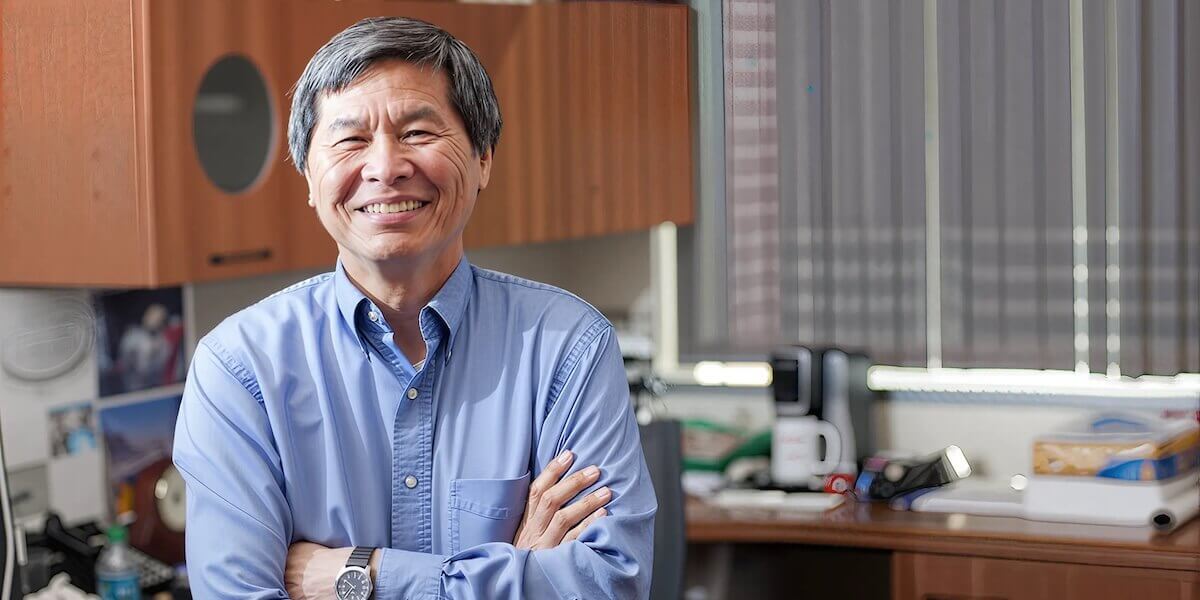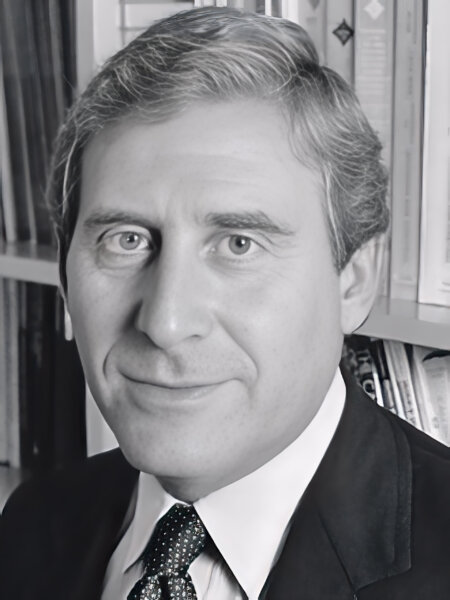In Memoriam
Leonard Silverman
Leonard Silverman, USC Dean Emeritus and professor of electrical and computer engineering, passed away on April 17, 2025. He was 85.
Silverman joined USC in 1968 and spent his entire academic career at the university as a faculty member in electrical and computer engineering — as chair of the school’s Electrical Engineering-Systems Department between 1981 and 1984 and as dean of the School of Engineering between 1984 and 2001. Silverman retired from USC in 2018.
He earned his Ph.D. at Columbia University in the control of time-variable systems. His research had an immediate impact on the field and led to his early election to the National Academy of Engineering in 1988.
“He was a serious and committed researcher and a respected leader,” said Andrew Viterbi (NAE 1978, NAS 1996), namesake of the USC Viterbi School of Engineering, co-founder of semiconductor giant Qualcomm, and recipient of one of the first doctorates in electrical engineering ever granted at USC.
During Silverman’s tenure as dean, he helped the school reach a number of important milestones: the founding of the Integrated Media Systems Center (IMSC), the first National Science Foundation (NSF) Engineering Research Center in multimedia and the internet; expansion of the Distance Education Network (DEN) for distance learning and its transition to web streaming; the founding of the Keck Photonics Lab, the first clean room on the USC campus; the creation of the USC Institute for Creative Technologies (ICT); and the recruitment of stellar faculty, including future USC President C. L. Max Nikias, who first joined the university in 1991 as a professor of electrical engineering and 18 months later became associate dean for research in the School of Engineering.
Silverman helped change the face of engineering at USC by expanding recruitment efforts, said Timothy Pinkston, USC Viterbi’s vice dean for faculty affairs and the George Pfleger Chair in Electrical and Computer Engineering.
“He was committed to a more diverse faculty, with my being the first Black tenure-track faculty hired in the school in 1993, and ultimately the first African American promoted through the faculty ranks to become tenured here,” Pinkston said.
Through the close relationships Silverman forged with myriad Southern California aerospace companies in the 1980s, he proved a “transformational” dean, said Nikias (NAE 2008). Under Silverman’s direction, the aerospace industry sent thousands of its employees to USC Engineering for advanced degrees.
Even when much of that money dried up in the early 1990s with the end of the Cold War and accompanying cutbacks in defense spending, Silverman still succeeded in convincing Hughes Aircraft to support the construction of the Hughes Aircraft Electrical Engineering Center, Nikias said. The building today houses the Ming Hsieh Department of Electrical Engineering and the USC Stevens Institute for Innovation.
“Len capitalized on the rise of the aerospace industry in Southern California and was able to connect [us] with local aerospace companies, where the school benefited enormously,” Nikias said.
Richard K. Miller, the former founding president of Olin College in Needham, Mass., served as USC School of Engineering’s associate dean for academic affairs under Silverman from 1989 to 1992. He said he found Silverman’s dedication and commitment inspiring.
“As a young academic, I learned an enormous amount from him that has served me well in leadership at other universities,” said Miller (NAE 2012), a two-time co-recipient of the NAE Bernard M. Gordon Prize for Innovation in Engineering and Technology Education. “His drive helped USC attract and retain a remarkable community of exceptional faculty and staff that formed the engine that drove the rise in national and international recognition.”
By engaging with the school’s Board of Councilors and alumni, Silverman helped transform USC Engineering into one of the most prominent engineering schools in the nation.
“I got a phone call one day: ‘Hi, I’m Len Silverman. I’m the dean of the engineering school.’ And the bottom line of it is that all of my philanthropic efforts trace directly back to that phone call,” said USC Trustee Dan Epstein, whose subsequent naming gift in 2002 created the first named academic department at USC, the Daniel J. Epstein Department of Industrial and Systems Engineering — now ranked among the best departments of its kind in the country.
Epstein later made gifts to support engineering doctoral student fellowships, new faculty and the Epstein Family Plaza, an outdoor space in the center of the Viterbi School’s engineering quad.
“[Len Silverman] was the linchpin. He came down and met with me in my office in San Diego, and I liked him from the moment I opened the door,” said Epstein, who has given more than $140 million to USC to date. “I felt I could be helpful with what he was trying to do with the school.”
As a national leader, Silverman helped shape the emergence of engineering education and research during rapidly changing times — by his astute investments in the nascent computing and electronics evolution, by navigating skillfully the end of the Cold War era, and by anticipating the emergence of engineering as the empowering discipline of our times.
USC Viterbi Dean Yannis C. Yortsos (NAE 2008), whom Silverman appointed as chair of chemical and petroleum engineering in 1991, a position Yortsos held until 1997, described Silverman’s leadership as “pragmatic and entrepreneurial, with a clear vision of the possibilities that engineering was creating at a rapid pace.”
Silverman is survived by his son, Phil Silverman, his daughter, Sarah Silverman Aibel, their spouses, and four grandchildren.
Larry Lim

Larry Lim served for 36 years as director of the USC Viterbi MESA (Math, Engineering, Science, Achievement) program. He was also served as the director of the USC Viterbi pre-college programs and later the Minority Engineering Program (MEP). In 2011, Lim received the USC President’s Staff Award. He recently passed away.
Darin Gray, a USC Viterbi alumnus and director of the USC Viterbi K-12 STEM Center, shared his thoughts about his mentor and friend.
“Larry Lim set a standard of excellence for engaging young people in STEM across Southern California. I met Larry over 40 years ago when I came to USC and started volunteering for MESA. I would see Larry in the then MEP/MESA office whenever I came by. Later, when I became an officer in the National Society of Black Engineers, I’d see him every day in his office full of cool stuff.
A few years after I graduated, Larry reached out to me to ask if I’d be interested in teaching young kids in the community around USC about science and engineering. He said that he needed someone who had an engineering and an education background. I had recently left my engineering career to become a teacher. With that meeting over a quarter century ago, I began my journey to what has become a career STEM education and outreach.
Early in my days at USC, Larry, who knew how ambitious I was. (I had graduated from USC with degrees in biomedical and electrical engineering and mathematics.); He asked what my goal was. I told him the first thing that came to mind, ‘To transform math, engineering, and science education in LA.’ He encouraged and empowered me to develop new and interesting projects and activities to inspire kids, parents, and teachers. He mentored me on engaging with USC leadership, as well as leaders in industry, education and in the community.
Larry created a foundation and left a legacy upon which I have been able to build and propel the USC Viterbi K-12 STEM Center into an international leader in STEM education and outreach. Because I grew up in a single parent household, the poem “If” by Rudyard Kipling served as one of my North Stars from my childhood. Larry’s calm and steady demeanor often represented to me an embodiment of the man described by Kipling in the poem. My mentor and my friend will surely be missed.”




